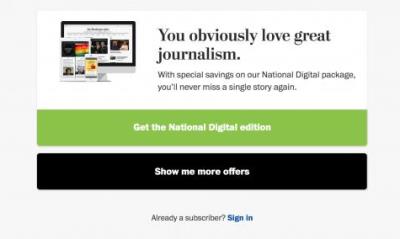Following up on our investigation of the economics of writing (see previous post ‘How Writers’ Income Sources Are Changing‘), an interesting perspective is given in this article ‘How Paywalls are Making Us Dumber‘. The thesis of this paper revolves around the paradox that great journalistic content needs to be compensated -hence paywalls and subscriptions- but that this prevents many people from accessing it, leaving space open for much less reliable news and even fake news, which are all freely accessible.

I believe it is useful to come back to a historical perspective. Since the beginning, journalism has been financed either by tycoons – sometimes well meaning, sometimes with the objective to manipulate – or by advertisement. Sometimes by both. In certain countries there are also subsidies by government, with all the problems related to free press. In general, the income from readers or subscriptions has always remained limited due to the costs of physical printing and distribution.
Therefore, it does not seem to me that the overall balance of financing of journalism is shifting dramatically. Jeff Bezos – a tycoon – had to take over the Washington Post recently; same happens in France for the main newspapers. Nor that fake news and opinionated papers have been around for lots of time. The current newspaper crisis is mainly linked to the fact that advertisement dollars have migrated elsewhere, and newspapers are struggling to compensate.
Of course, the reach of internet and the easier spreading of fake news is a concern, as well as the difficulty to effectively regulate it. There are still many sources of quality information sufficiently open to benefit from it. Financing a news outlet only with income from readers has always been an illusion. At the same time it does not seem to me that paywalls are really a problem, in particular if they let read a few key articles per month for free if one investigates a specific subject. What do you think?
